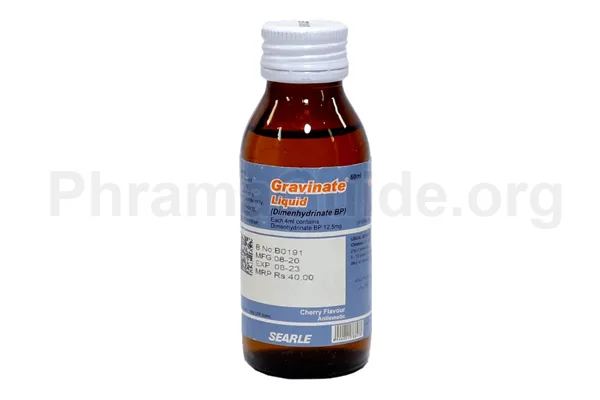Gravinate syrup is an antihistamine that is used to prevent and treat nausea, vomiting, and dizziness caused by motion sickness. It is also sometimes used to treat Meniere’s disease (a condition of the inner ear that causes extreme dizziness, loss of balance, ringing in the ears, and hearing loss) and other inner ear problems. The following are some common uses and indications of Gravinate Syrup:
- Motion Sickness: Gravinate syrup is frequently used to prevent and relieve symptoms of motion sickness, which can occur during travel by car, boat, or plane. It helps reduce dizziness, nausea, and vomiting associated with motion sickness.
- Nausea and Vomiting: Gravinate syrup can be used to manage nausea and vomiting caused by various factors, including stomach flu (gastroenteritis), inner ear problems (such as labyrinthitis), medication side effects, and other conditions that can lead to these symptoms.
- Vertigo: Gravinate syrup may also be prescribed to alleviate symptoms of vertigo, a condition characterized by a spinning sensation or dizziness. It can help reduce dizziness and associated discomfort.
Off-label Uses of Gravinate Syrup
- Anxiety: Some anecdotal reports suggest that Gravinate may have mild sedative and anxiolytic (anti-anxiety) effects. However, its use for anxiety is not well-established or supported by extensive scientific evidence, and other medications are typically recommended for anxiety disorders.
- Sleep Aid: Due to its sedative properties, Gravinate may be used off-label as a sleep aid by some individuals. However, there are other medications specifically designed for sleep disorders that are generally considered more appropriate and effective.

What is Gravinate?
Gravinate syrup is one of the leading brands of Dimenhydrinate in oral liquid form, manufactured and marketed by Searle Pharmaceuticals Pakistan.
Gravinate Alternatives : Other Dimenhydrinate Brands
The following are some alternative brands of Gravinate syrup and their manufacturers.
- Dymin : Stanley Pharmaceuticals (Pvt) Ltd, Pakistan.
- Dramamine : Pfizer Laboratories Inc.
- Dramine : Safe Pharmaceutical (Pvt) Ltd, Pakistan.
- Demax : Delux Chemical Industries, Pakistan.
- Dimentin : Munawar Pharma (Pvt) Ltd, Pakistan.
- Hedrinate : Lisko Pakistan (Pvt) Ltd.
- Imcomine : Imco Pharmaceuticals laboratories, Pakistan.
- Vomac-Oral : Mac & Rans Pharmaceuticals (Pvt) Ltd, Pakistan.
- Devinate : Polyfine Chempharma (Pvt) Ltd, Pakistan.
- Dimate : Rock Pharmaceuticals, Pakistan.
Gravinate : Available Formulations and Strengths
Presently, Gravinate is available in Syrup, Tablet, and Injection forms.
Gravinate Syrup : 12.5mg/4ml.
Gravinate Tablet : 50mg Strength.
Gravinate Injection : 50mg Strength.
Who Should Not Use Gravinate?
Gravinate syrup has certain contraindications, which means there are circumstances in which its use is not recommended or should be avoided.
Hypersensitivity: Individuals who have a known allergy or hypersensitivity to Gravinate or any of the ingredients in the syrup should avoid its use
Glaucoma: Gravinate syrup is contraindicated in individuals with closed-angle glaucoma. The medication can potentially cause an increase in intraocular pressure, which may worsen the condition and lead to further eye damage.
Urinary Retention: Gravinate syrup should be used with caution or avoided in individuals with urinary retention, as it can exacerbate this condition. Gravinate can have anticholinergic effects, which can affect bladder function and lead to difficulty urinating.
Severe Liver Disease: Gravinate syrup is generally contraindicated in individuals with severe liver disease or impaired liver function. The medication is metabolized in the liver, and impaired liver function can affect its clearance from the body.
Respiratory Depression: Gravinate syrup should be used with caution or avoided in individuals with respiratory depression, such as those with severe chronic obstructive pulmonary disease (COPD) or asthma. The medication can have sedative effects and may further suppress respiratory function in individuals with compromised lung function.
Recommended Daily Dosage of Gravinate Syrup
Gravinate Syrup Dose for Motion Sickness:
- Children 2 to 6 years old: 2.5 ml (12.5 mg) to 5 ml (25 mg) every 6 to 8 hours as needed.
- Children 6 to 12 years old: 5 ml (25 mg) to 10 ml (50 mg) every 6 to 8 hours as needed.
- Adults and children over 12 years old: 10 ml (50 mg) to 20 ml (100 mg) every 4 to 6 hours as needed.
Gravinate Syrup Dose for Nausea and Vomiting:
- Children 2 to 6 years old: 2.5 ml (12.5 mg) to 5 ml (25 mg) every 6 to 8 hours as needed.
- Children 6 to 12 years old: 5 ml (25 mg) to 10 ml (50 mg) every 6 to 8 hours as needed.
- Adults and children over 12 years old: 10 ml (50 mg) to 20 ml (100 mg) every 4 to 6 hours as needed.
How Gravinate Works?
Gravinate is an antihistamine that works by blocking histamine receptors in the body. Histamine is a chemical that is released by the body in response to allergens or motion. When histamine is released, it can cause symptoms such as itching, hives, and nausea. Gravinate blocks these receptors, preventing histamine from causing these symptoms.
In addition to blocking histamine receptors, Gravinate also has anticholinergic effects. Anticholinergics are drugs that block the effects of acetylcholine, a neurotransmitter that is involved in many bodily functions, including movement, heart rate, and digestion. The anticholinergic effects of Gravinate are thought to contribute to its ability to relieve nausea and vomiting.
Related Links:

Leave A Comment